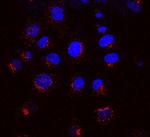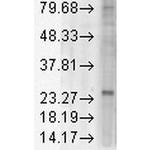Search Thermo Fisher Scientific
FIGURE: 1 / 2
KDEL Receptor Antibody (11078-100UG) in ICC/IF


Product Details
11078-100UG
Species Reactivity
Host/Isotype
Class
Type
Clone
Immunogen
Conjugate
Form
Concentration
Purification
Storage buffer
Contains
Storage conditions
Shipping conditions
Target Information
The sequence Lys-Asp-Glu-Leu (KDEL) or a closely related sequence, is present at the carboxy-terminus of soluble endoplasmic reticulum (ER) resident proteins and some membrane proteins. 78 and 94 kDa glucose regulated proteins, GRP78 and GRP94 respectively, and protein disulfide isomerase (PDI) all share the C-terminal KDEL sequence. The presence of carboxy-terminal KDEL appears to be necessary for ER retention and appears to be sufficient to reduce the secretion of proteins from the ER. This retention is reported to be mediated by a KDEL receptor.
For Research Use Only. Not for use in diagnostic procedures. Not for resale without express authorization.
References (0)
Bioinformatics
Protein Aliases: 108K heat shock protein; 108K HSP; 78 kDa glucose-regulated protein; 78-kD glucose-regulated protein precursor; 94 kDa glucose-regulated protein; 94 kDa glucose-regulated protein {ECO:0000250|UniProtKB:P08113}; 98 kDa protein kinase; Binding-immunoglobulin protein; BiP; BiP protein; CG5183-PA; CG5183-PB; CG5183-PC; Endoplasmic reticulum chaperone BiP; endoplasmic reticulum lumenal Ca(2+)-binding protein grp78; Endoplasmic reticulum resident protein 99; Endoplasmin; endoplasmin {ECO:0000250|UniProtKB:P08113}; endothelial cell (HBMEC) glycoprotein; epididymis luminal protein 35; epididymis secretory sperm binding protein Li 125m; epididymis secretory sperm binding protein Li 89n; ER lumen protein retaining receptor 1; ER lumen protein retaining receptor 2; ER lumen protein-retaining receptor; ER lumen protein-retaining receptor 1; ERp99; glucose regulated protein, 78 kDa; glucose-regulated protein; glucose-regulated protein GRP94; glucose-regulated protein, 78kDa; gp96 homolog; GRP 78; GRP-78; GRP-94; GRP94; Heat shock 108 kDa protein; heat shock 70 kDa protein 5; heat shock 70 kDa protein 5a; heat shock 70kD protein 5; heat shock 70kD protein 5 (glucose-regulated protein, 78kD); heat shock 70kDa protein 5 (glucose-regulated protein); heat shock 70kDa protein 5 (glucose-regulated protein, 78kDa); heat shock protein 108; heat shock protein 108.; heat shock protein 5; Heat shock protein 70 family protein 5; Heat shock protein 90 kDa beta member 1; heat shock protein 90 kDa beta member 1 {ECO:0000250|UniProtKB:P08113}; heat shock protein 90, beta (Grp94), member 1; heat shock protein 90kDa beta (Grp94), member 1; heat shock protein 90kDa beta family member 1; heat shock protein 90kDa beta, member 1; Heat shock protein family A member 5; Heat shock protein family C member 4; heavy-chain binding protein BiP; HSP 108; hsp108; hsp70; HSP70 family protein 5; HSP90 beta; hsp90b1 {ECO:0000250|UniProtKB:P08113}; immunoglobulin binding protein; Immunoglobulin heavy chain-binding protein; KDEL; KDEL (Lys-Asp-Glu-Leu) endoplasmic reticulum protein retention receptor 1; KDEL endoplasmic reticulum protein retention receptor 1; KDEL receptor 1; KDEL receptor-like protein; KDEL-receptor; KdelR-PA; KdelR-PB; KdelR-PC; lethal (2) 31Em; Lys-Asp-Glu-Leu; Polymorphic tumor rejection antigen 1; PPK 98; Putative MAPK-activating protein PM23; RP23-446N16.1; Steroidogenesis-activator polypeptide; stress-inducible tumor rejection antigen gp96; Transferrin-binding protein; transforming growth factor alpha regulated gene 2; tumor rejection antigen (gp96) 1; Tumor rejection antigen 1; Tumor rejection antigen gp96; XAP-1 antigen
Gene Aliases: 8030486F04Rik; AL022860; AU019543; AW215843; baffled; BEST:CK00230; BIP; BiP/Grp78; CG5183; CK00230; D2Wsu141e; D2Wsu17e; Dmel\CG5183; Dmel_CG5183; dmErd2; ECGP; endoplasmin; ERD2; ERD2.1; ERp99; GP96; GRP78; GRP94; HDEL; HEL-S-125m; HEL-S-89n; HEL35; Hsce70; hsp108; HSP90B1; HSPA5; hspa5a; HSPC4; I79_019946; I79_020931; KDELR; KDELR1; l(2)31Em; l(2)k00311; mBiP; MIF2; PM23; ppk98; SEZ-7; Sez7; TA-3; Targ2; Tra-1; TRA1; XAP-1; XELAEV_180384511mg
UniProt ID: (Pig) Q29092, (Dog) P41148, (Bovine) Q95M18, (Chicken) P08110, (Human) P14625, (Chicken) Q90593, (Bovine) Q0VCX2, (Human) P11021, (Rat) Q66HD0, (Mouse) P08113, (Mouse) P20029, (Chinese hamster) G3I8R9, (Rat) P06761, (Bovine) P33946, (Human) P24390, (Fruit fly) O76767, (Mouse) Q99JH8, (Rat) Q569A6, (Xenopus) Q91883
Entrez Gene ID: (Pig) 397191, (Rabbit) 100009456, (Dog) 404019, (Bovine) 282646, (Chicken) 374163, (Human) 7184, (Sheep) 101111703, (Chicken) 396487, (Sheep) 780447, (Dog) 480726, (Pig) 407060, (Rabbit) 100008764, (Bovine) 415113, (Human) 3309, (Chinese hamster) 100773331, (Rat) 362862, (Mouse) 22027, (Mouse) 14828, (Chinese hamster) 100689305, (Rat) 25617, (Pig) 100520962, (Bovine) 618184, (Sheep) 101122047, (Human) 10945, (Dog) 484406, (Rabbit) 100349892, (Fruit fly) 34427, (Chinese hamster) 100750912, (Mouse) 68137, (Rat) 361577, (Xenopus) 397850

Performance Guarantee
If an Invitrogen™ antibody doesn't perform as described on our website or datasheet,we'll replace the product at no cost to you, or provide you with a credit for a future purchase.*
Learn more
We're here to help
Get expert recommendations for common problems or connect directly with an on staff expert for technical assistance related to applications, equipment and general product use.
Contact tech support
